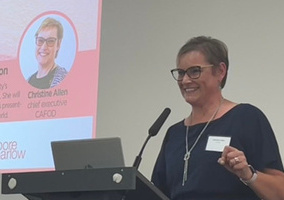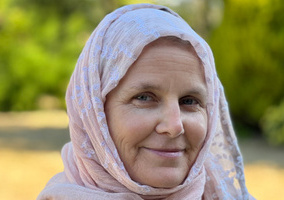Faith charities have reported finding it harder to obtain grants than other organisations due to the nature of their work.
Christian Aid reported experiencing “cautious concern” when seeking funds, notably from the private sector.
Mental health charities Muslim Youth Helpline (MYH) and Inspirited Minds, which both rely on grant funding, described being hesitant to apply for larger grants after being rejected previously without explanation and for fear of being stereotyped.
The Muslim Charities Forum (MCF) said faith-led charities can struggle to be considered eligible for funding despite their reach across communities due to a “lack of understanding” from grantmakers.
Meanwhile, the National Lottery Community Fund (NLCF) said it would fund faith-based charities but not for activities that promote religion.
Funders can show ‘cautious concern’
Anti-poverty charity Christian Aid saw its income fall by 9% in 2021-22 to £78.4m, mostly due to a reduction in institutional grants and government contracts.
The charity provides grants to local and national organisations around the world. But as a grant recipient and a Christian organisation, it has experienced “cautious concern” from funders when accessing grants.
“This is most typically the case in the private sector,” a spokesperson said.
“Christian Aid works with people of all faiths and none. We work with local partners and communities to fight injustice, respond to humanitarian emergencies, campaign for change, and eradicate poverty.
“It’s therefore disappointing when policy prohibits partnership as in our experience, once prospective partners understand what we do, any concerns are quickly overcome.
“We believe the private sector has a crucial part to play in ending poverty and injustice and creating a world where everyone can live a full life, free from poverty. We therefore embrace working with the private sector, and others, to achieve those aims.”
‘It’s a challenge to be seen or heard’
MYH is a mental health charity that primarily supports young Muslim people through its helpline. According to its latest accounts, it had a total income of £189,827 in 2021, with grants accounting for about 40%.
Maaria Mahmood, MYH’s director, said the charity has struggled to successfully applied for “generic funds and grants that are available just to do good”.
“We’ve previously applied for larger grants but weren’t successful so we’ve stopped applying. Mental health grants, because they’re such a niche, are more accessible and these funders are happy to take applications from anyone. They understand the faith and cultural sensitivity part of a service and because of that faith-based organisations do thrive, but beyond that we wouldn’t,” Mahmood said.
Although MYH describes itself as a “faith and culturally sensitive organisation”, it does not provide religious advice or guidance. Despite this, some funders have refused to fund the charity due to its name.
Mahmood said: “It’s a challenge to be seen or heard. The grants that we do apply for, we tend to be quite successful because we’re very selective of where we’re putting our efforts and our applications in. A lot of organisations do recognise mental health charities for specific groups, which is nice. But if you look at the grand scheme of things and all of the grants and opportunities available, this is a very tiny amount. Although we’re celebrating it, it’s still minute.”
She added that because her charity specialises in mental health and young people, it may have an advantage over other Muslim charities.
“From what I’ve heard, a lot of Muslim charities have a much harder time applying for funding and getting funding maybe because of the type of work they do. It might not be as topical as mental health and not for young people. You have to be the right type of faith organisation to fit in.”
‘We feel we’ll be automatically stereotyped’
Similarly, Inspirited Minds helps Muslims with mental health issues but also has non-Muslim beneficiaries. Last year, it had an income of £83,200, of which nearly 45% came from grants.
Sarah Gulamhusein, communications manager at Inspirited Minds, said that the charity is increasingly relying on grants to stay afloat.
“As we grew and realised that there was more and more demand for our services, we started looking into getting funding. For the last two years, it has been a struggle to try and get that funding not only for our core operations but also for counselling, support services and our day-to-day projects,” Gulamhusein said.
Inspirited Minds often finds it difficult to apply for grants even when it is not looking to fund religious activities. “We’re anxious or hesitant to apply for certain grants because we feel like we’ll be automatically stereotyped,” Gulamhusein added.
Last year, the charity applied for three grants, specifying in the applications that it was a Muslim organisation that has both faith and non-faith centric operations. But it did not get any of these grants and Gulamhusein said it was never given a proper explanation as to why it was unsuccessful.
She said: “It’s got to a point where even though we qualify for a grant, we have to have that extra consideration about who’s giving the money and whether they’re more likely to stereotype us just because of our past experience. Not only does it take more time but it also pushes us to just consider a small subset of people giving grants like those who are more open to giving grants to Muslim organisations. That really limits the number of applications we make.”
NLCF: ‘We may fund non-religious work by faith charities’
A spokesperson for NLCF said: “National Lottery funding is for everyone and we fund things that are important to communities, responding to the challenges they face.
“While we don’t fund activities that specifically promote religion, we may fund non-religious activities delivered by religious organisations if they’re well suited to work with that community and its needs.
“An example of this could be funding a church group that encourages its neighbours to visit isolated elderly people for a chat and a cup of tea as a way of tackling loneliness within the community.”
MCF: ‘Funders must proactively work with faith charities’
Fadi Itani, chief executive of MCF, acknowledged that faith-led charities can struggle to be considered eligible for funding despite their reach across communities.
However, he argued that Muslim-led charities particularly face significant barriers, which include “lack of understanding and wider intersectionality”.
“It’s imperative that funding bodies understand the importance of faith-led organisations and are proactive in building relationships and opening their communications and networks to Muslim-led groups in a two-way learning in order to benefit some of the most vulnerable communities,” he added.
Related articles













